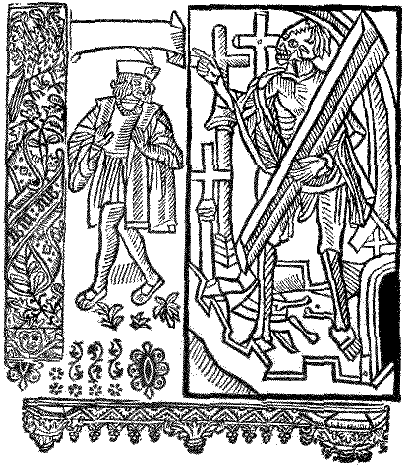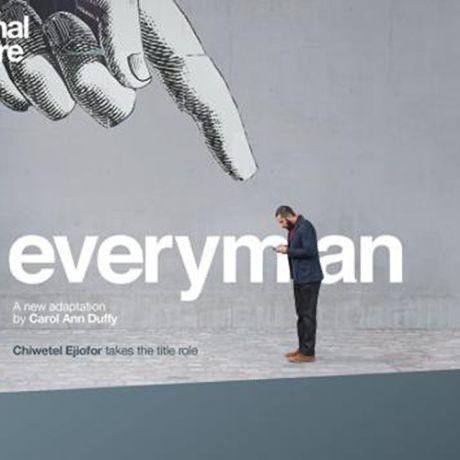|
Everyman tells --
Everyman is as fearful of dying as the rest of us. When Death identifies himself, Everyman does what every cowardly person would do, he begs for more time, saying he’s not ready, and when all else fails, he tries to bribe Death. Worse than being a bogey-man, Death is businesslike and offers unarguable reasons why he cannot be bribed. When Everyman knows that the summons is inescapable, he turns in the wrong direction. He expects other people to save him. Friendship and Kindred are false friends who promise to accompany him on his journey; yet each forsakes him when they hear of his destination. Then Everyman goes even further afield, to Goods. He expects his worldly wealth to save him. Trust in other mortals is useless, but trust in Goods is damnable. “Lay not up for yourselves treasures upon earth, where moth and rust doth corrupt, and where thieves break through and steal: But lay up for yourselves treasures in heaven, where neither moth nor rust doth corrupt, and where thieves do not break through nor steal: For where your treasure is, there will your heart be also.” (Matthew 6:19-21) In despair, Everyman turns at last to Good Deeds (who could save him if strong). Like Goods (a nice touch of parallelism), Good Deeds is bound up, but for a different reason. Good Deeds is pitiably weak. Only if strengthened, can his Good Deeds save him. From this point on, Everyman’s fortunes improve, and he gains various friends. These friends -- parts of himself -- are more reliable than the earlier ones, and Everyman becomes hopeful and happy. But again, he must be disappointed: Beauty, Strength, Five Wits, and Knowledge will not pass with him through the grave. He expects his own physical properties to save him. Knowledge helps Everyman strengthen Good Deeds because when Everyman knows he has sinned, he has the Knowledge to repent. Ultimately only Good Deeds can accompany him for his reckoning.
A Strategy for Introducing and Explaining the Concept of Allegory Playing the following “What If” Game may help make the concept clearer: Suppose that you were assigned to write a skit for middle school children which would teach them how to overcome any obstacles that might keep them from graduating. Since you can't act out every single thing that might happen in the four years of high school, you would have to be selective and choose events which might represent typical problems faced by every student. Obviously, students who don’t graduate don’t pass enough classes to receive a diploma. When the counselor summons them to give a reckoning of their four years’ work, students who fail don’t have enough credits in their account. Part-time jobs, family problems, poor health, romance, friendship, extra-curricular activities, drugs, laziness and anything else that was more important than school work might have caused failure. How can you dramatize these problems? You could use personification and select character types which would represent the temptations Every Student faces during his journey to Graduation. As your skit begins, Every Student could carry a notebook and six or seven textbooks. When he sits at his desk to do his homework, Coach could interrupt his studies and make Every Student do calisthenics instead. When Every Student finally returns to his books, Hippie could tempt him with drugs. And so on and so on. These characters would be stereotypes which your audience would recognize immediately because of costume and behaviour. Of course, you could represent helpful forces as well. Every Student’s moral strength could be personified by Preacher who would protect him from temptations. Whenever Every Student interacted with these other characters, you would be dramatizing abstract problems faced by every student. At the same time, you would be teaching a moral lesson by showing your audience how to overcome obstacles and successfully reach Graduation. Your skit would be a morality play, much like Everyman. A morality play is an allegory in which characters personifying abstract ideas teach a moral lesson by acting out the conflict between Good and Evil.
|
 EVERYMAN: Teacher Guide
EVERYMAN: Teacher Guide